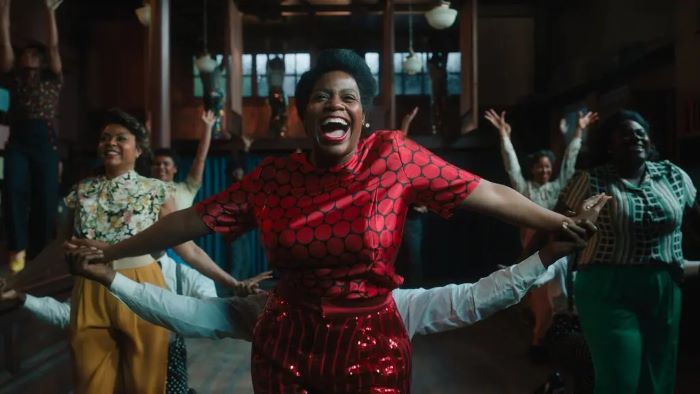
From left, Taraji P. Henson, Fantasia Barrino, and Danielle Brooks in The Color Purple (Warner Bros. Pictures)
For those who have been weaned on Steven Spielberg’s 1985 engaging film adaptation of Alice Walker’s enduring, 1982 Pulitzer Prize–winning novel, director Blitz Bazawule’s latest musical incarnation (he helmed Beyonce’s music film Black Is King) is a bit disarming at first.
Based upon the 2005 Broadway musical, the film is absent of Quincy Jones’s tender, melancholy score and Whoopi Goldberg’s wry voice-over narration of Walker’s epistolary tale. In this new version, sunlight bleeds everywhere (a motif throughout in Dan Laustsen’s picaresque cinematography) and a bombastic, rousing gospel opening number, “Mysterious Ways,” sets the style and tone. Quickly, however, Bazawule’s film finds its groove and strength, especially through the tremendous talents of its cast.
Set in rural Georgia over the decade-spanning course of the 1910s into the 1940s, the story follows the life of Celie (Phylicia Pearl Mpasi plays her as a youth and Fantasia Barrino in her adult years—both fantastic). As a teenager, she is forced to marry the abusive Mister (Colman Domingo), and becomes separated from her sister, Nettie (The Little Mermaid’s Halle Bailey), after Nettie spurns and fights off Mister’s aggressive attention.
In their small Georgia town, Celie befriends the steely Sofia (scene-stealer Danielle Brooks) and the brassy juke joint singer Shug Avery (Taraji P. Henson), a former lover of Mister, who gets her own big number on the heels her arrival. Though still restrained, the lesbian relationship between Shug and Celie is much more apparent in Bazawule’s version than Spielberg’s, with a dreamy musical number, a shared kiss, and the two waking up in bed. Celie’s journey can be harrowing, including having her children taken away from her when she’s a young girl, but Walker’s story, with its intricate characters, weaves together a classic American dream saga of a poor Black woman in the South who rises spiritually and materially that has remained a touchstone through the years.
There is little subtlety or mystery to be found in Bazawule’s film, though these are not really qualities of movie musicals anyway. One is here for the story, but also the performances, which are uniformly terrific. The biggest surprise for me is Barrino, knowing only of her pop star image, who also played Celie on Broadway in the 2015 revival. Her scratchy, but powerful voice is dynamic in all her numbers, especially in the 11 o’clock number, “I’m Here.” Because it’s one of the rarer numbers where Bazawule dials down some of the busyness of scenery and flash, the big ballad is particularly impactful. At first, it’s difficult to not think of Goldberg’s incredible debut, but Barrino proves a marvelous screen presence with her authentic, powerful turn.
Henson is always great, and the flashy, yet caring Shug is a perfect character to show off her strengths as an actress, and it’s a delight to see her belt some big numbers. Brooks, Tony-nominated for her Broadway debut as Sofia in 2015, slams through the picture with rigor, humor, emotion, and astonishing singing. The funny early number “Hell No” is a highlight. Fatima Robinson’s choreography is dynamic, as is Francine Jamison-Tanchuck’s costume design. When their two vocations plus the performances fuse together, such as on “Miss Celie’s Pants,” it’s electrifying.
















Leave A Comment